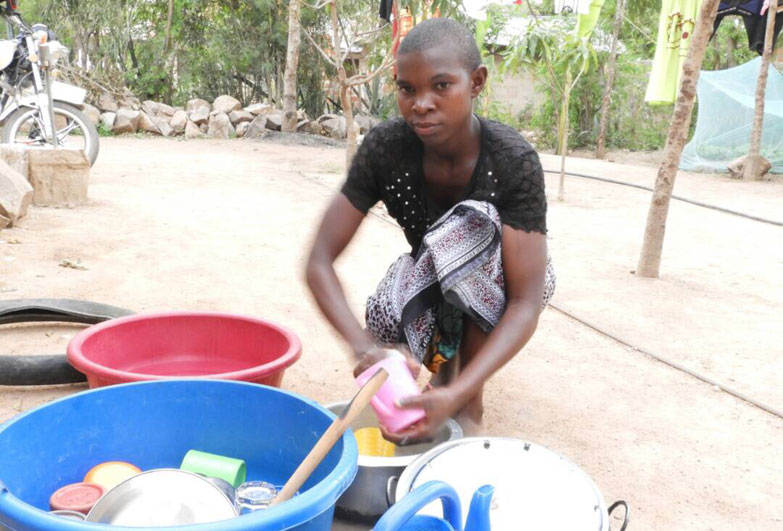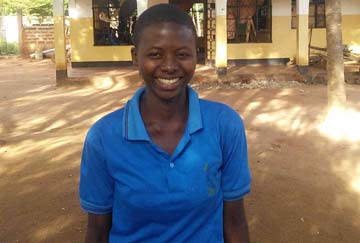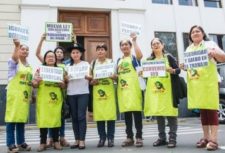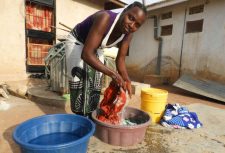Disclaimer: This article is more than 6 years old, and may not include the most up-to-date information or statistics. Please verify information with more recent sources as needed, and if you have any questions contact our Press Office.
Sarah Mathewson on our new campaign to realise aspirations of children locked in slavery.

7 November 2017
Catherine has been a domestic worker since she was fourteen. Her family was so poor they struggled to afford even one meal a day, let alone to send her to school.
She went to Mwanza, in northern Tanzania, and found a job washing clothes, cleaning floors, and cooking for a family. She hoped to go to school then, but it was just too hard to find time and strength after hours of physically demanding domestic chores. She was often cheated out of her wages and found herself isolated from the outside world.
“We and our partners work hard to unlock the potential of the children we work with.”
Catherine came across Anti-Slavery’s project in Mwanza, run by a coalition of organisations working with child domestic workers. She attended training on domestic workers’ rights and classes aimed at raising children’s self-confidence, and slowly started coming out of her shell. ‘This work has helped me know my rights so that I can protect myself. My employer is now paying me promptly”, she said.
All her problems are not solved yet, but for the fi rst time in her life Catherine can see into the future with hope and expectations: “In the future I want to have my own business – either in food or clothing. I don’t want to be employed by anyone anymore.”
Vulnerable, isolated, exploited
Catherine is one of the estimated one million child domestic workers in Tanzania.
Children – the majority of them girls – often migrate from poorer rural areas to cities. Living in homes of their employers far from their families, they are highly vulnerable to exploitation and abuse.
Child domestic work in Tanzania is driven principally by the extreme poverty of so many families like Catherine’s. Many girls run away from home to avoid domestic abuse or forced marriage, only to then end up as domestic workers.
Anti-Slavery research in 2012 uncovered shocking numbers: 40% of child domestic workers suffer physical abuse, 17% suffer sexual abuse, over half receive little or no pay despite working over 60 hours a week. Up to 30% are under the national working age of fourteen. Fewer than 1% have formal contracts.
What makes child domestic work particularly diffi cult to address is that the children fall into a vicious cycle of abuse and neglect: over 60% don’t go to school and are illiterate, most suffer from extreme isolation and lack of self-confi dence, which hugely diminishes their chances of getting out of domestic work to find decent jobs in a formal sector. Their futures are locked in a cycle of exploitation, which easily extends to conditions of slavery.

BBC Radio 4 Appeal
Our work to protect children from domestic slavery in Tanzania is featured in our BBC Radio 4 appeal
Unlocking children’s future
Anti-Slavery International knows there are no easy solutions to slavery, and its response requires addressing these complex issues in a holistic way.
Together with our partners from the Tanzania Domestic Workers Coalition, we run comprehensive campaigns to raise child domestic workers’ awareness of their rights, involve them in advocacy to build their confidence and, importantly, provide vocational training to give them a chance to change their careers. We run a shelter for children whose safety is at risk.
We bring children together in committees, allowing them to organise and take things into their own hands, reach out to other children in domestic work, stand up for each other, and intervene in concrete cases of exploitation in their local areas.
We work with children’s employers, negotiating better conditions for the children, and organising special training raising awareness of children’s rights, including contracts, decent pay, access to school, and freedom from any form of abuse.
Working at a local community level has been extremely effective in Tanzania, from engaging ‘street leaders’, to implementing ‘community by-laws’ protecting children’s rights.
A survey by Anti-Slavery last year revealed that in the areas where we worked, attitudes to child domestic workers had changed completely. For example, 103 child domestic workers had contracts in the area with a by-law, compared to zero in the neighbouring one, whilst in one of the areas with a by-law 100% of children surveyed were receiving regular pay, unheard of in other areas. We plan to roll out this ‘by-law’ approach with the aim of the government scaling up this approach across other areas.
We and our partners work hard to unlock the potential of the children we work with. Children like Catherine, who, with a little support, start flourishing and, for the first time in their lives, are hopeful for their future.





